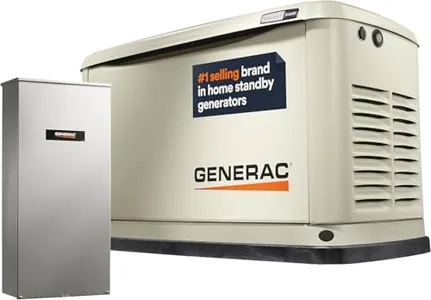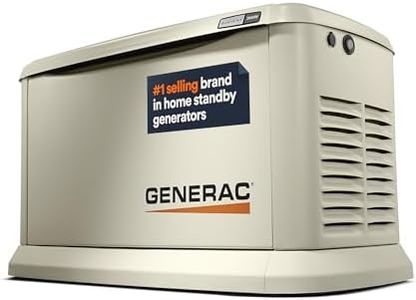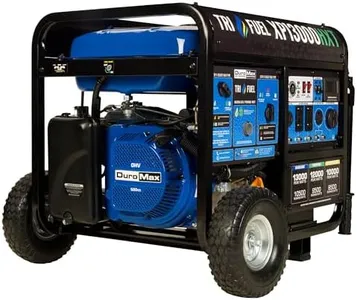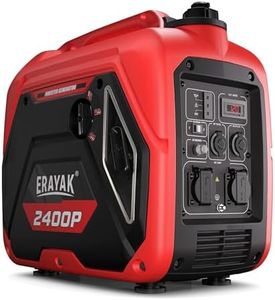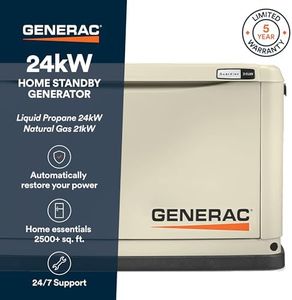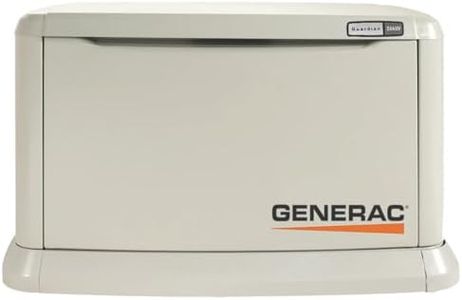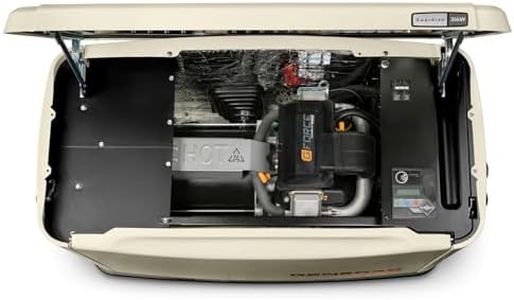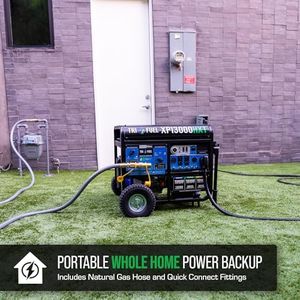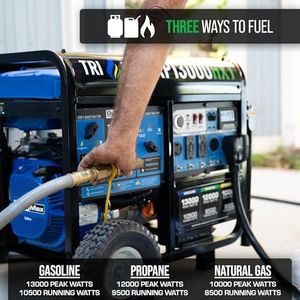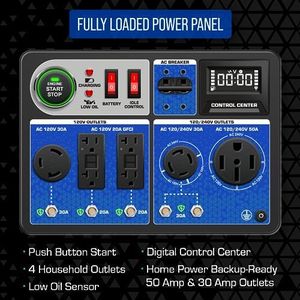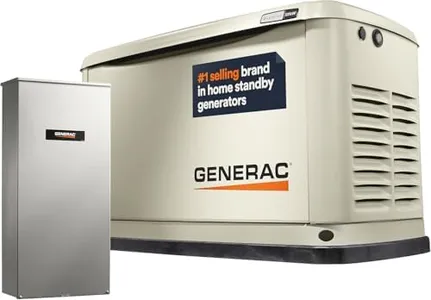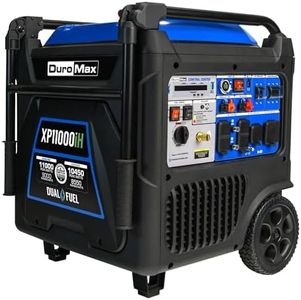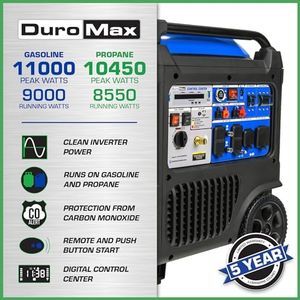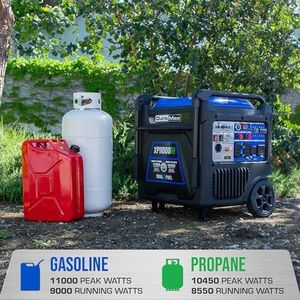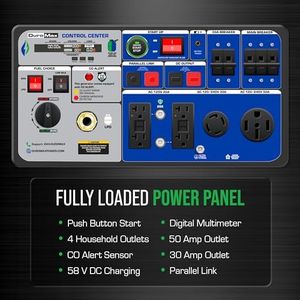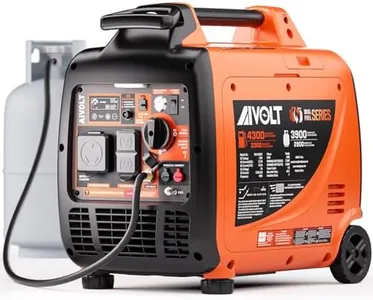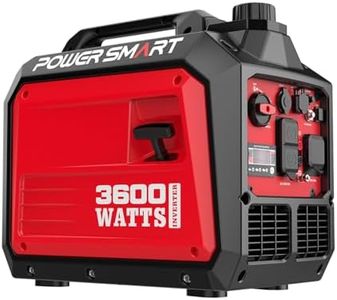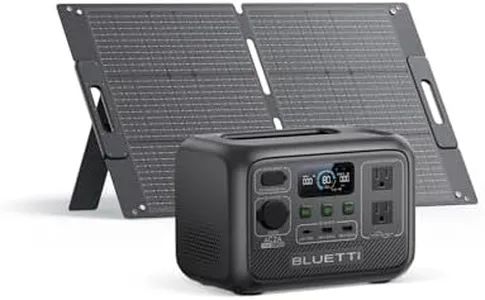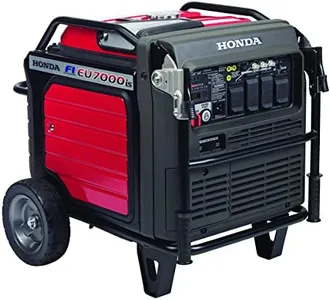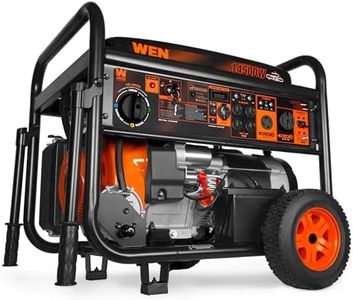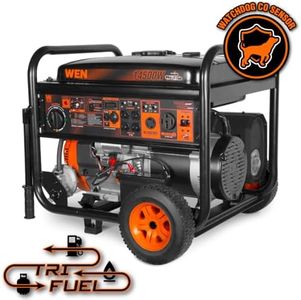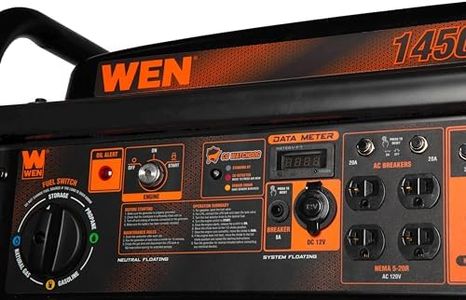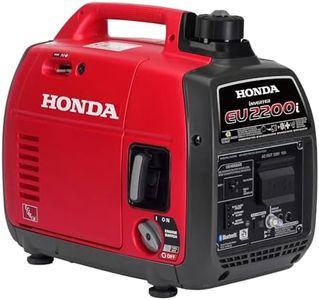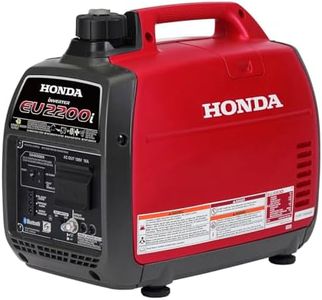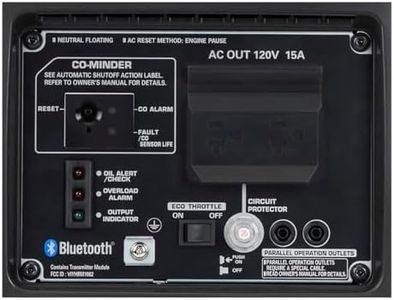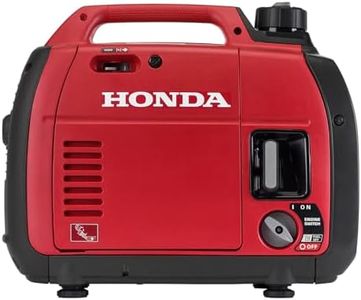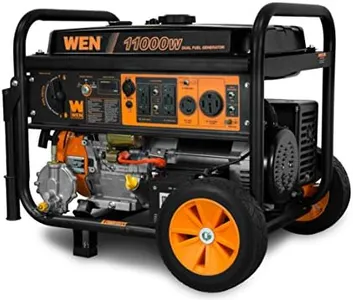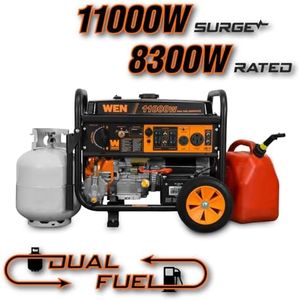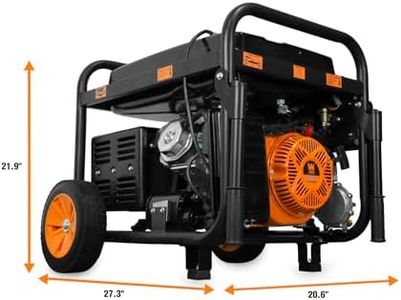10 Best Generators 2026 in the United States
Winner
Generac Guardian 24kW Home Standby Generator with 200 Amp Transfer Switch - Automatic Whole House Backup Power for Storms, Emergencies, and Outages, WiFi Enabled, Runs on Natural Gas or Liquid Propane
The Generac 7210 24kW Air Cooled Guardian Series Home Standby Generator is a robust choice for homeowners looking for dependable power during outages. One of its standout features is the impressive 24,000 watts of power output, which is more than sufficient to keep essential appliances running smoothly. The generator is designed to operate on natural gas or LP gas, making it flexible regarding fuel options. Its 200-amp transfer switch ensures that your entire home can be powered, providing peace of mind during unexpected blackouts.
Most important from
65 reviews
Generac Guardian 26kW Home Standby Generator - Automatic Whole House Backup Power for Storms, Emergencies, and Outages, WiFi Enabled, Runs on Natural Gas or Liquid Propane, Quiet Operation
The Generac Guardian 26kW Home Standby Generator is a solid choice for homeowners needing reliable backup power during outages, storms, or emergencies. It offers a powerful 26,000-watt output, enough to support an entire home, which means you can keep most or all of your essential appliances running simultaneously. This model runs on natural gas or liquid propane, giving flexibility depending on your available fuel sources. It features Generac's G-Force 1000 Series engine known for durability and efficient fuel use, which helps keep operational costs lower over time.
Most important from
11 reviews
DuroMax XP13000HXT 13,000-Watt 500cc Tri Fuel Gas Propane Natural Gas Portable Generator with CO Alert, Black/Blue
The DuroMax XP13000HXT is a powerful portable generator offering up to 13,000 starting watts and 10,500 running watts, making it suitable for whole-home backup during power outages or for commercial use. One of its standout features is the tri-fuel capability, meaning it can run on gasoline, propane, or natural gas. This flexibility lets you choose the most convenient or cost-effective fuel available. It has a robust 500cc engine designed to deliver reliable power and includes a push-button and remote start system for easy operation, which is handy if you need to start it from a distance.
Most important from
2389 reviews
Top 10 Best Generators 2026 in the United States
Winner
Generac Guardian 24kW Home Standby Generator with 200 Amp Transfer Switch - Automatic Whole House Backup Power for Storms, Emergencies, and Outages, WiFi Enabled, Runs on Natural Gas or Liquid Propane
Generac Guardian 24kW Home Standby Generator with 200 Amp Transfer Switch - Automatic Whole House Backup Power for Storms, Emergencies, and Outages, WiFi Enabled, Runs on Natural Gas or Liquid Propane
Chosen by 1347 this week
Generac Guardian 26kW Home Standby Generator - Automatic Whole House Backup Power for Storms, Emergencies, and Outages, WiFi Enabled, Runs on Natural Gas or Liquid Propane, Quiet Operation
Generac Guardian 26kW Home Standby Generator - Automatic Whole House Backup Power for Storms, Emergencies, and Outages, WiFi Enabled, Runs on Natural Gas or Liquid Propane, Quiet Operation
DuroMax XP13000HXT 13,000-Watt 500cc Tri Fuel Gas Propane Natural Gas Portable Generator with CO Alert, Black/Blue
DuroMax XP13000HXT 13,000-Watt 500cc Tri Fuel Gas Propane Natural Gas Portable Generator with CO Alert, Black/Blue
Generac Guardian 22kW Home Standby Generator with 200 Amp Transfer Switch - Automatic Whole House Backup Power for Storms, Emergencies, and Outages, WiFi Enabled, Runs on Natural Gas or Liquid Propane
Generac Guardian 22kW Home Standby Generator with 200 Amp Transfer Switch - Automatic Whole House Backup Power for Storms, Emergencies, and Outages, WiFi Enabled, Runs on Natural Gas or Liquid Propane
DuroMax XP11000iH 11,000-Watt Dual Fuel Portable Digital Inverter Generator - Gas & Propane, Remote Electric Start, Transfer Switch Ready, RV & Emergency Ready
DuroMax XP11000iH 11,000-Watt Dual Fuel Portable Digital Inverter Generator - Gas & Propane, Remote Electric Start, Transfer Switch Ready, RV & Emergency Ready
Honda EU7000IS 7,000 Watt Inverter Portable Backup Generator, Super Quiet, Electric Start
Honda EU7000IS 7,000 Watt Inverter Portable Backup Generator, Super Quiet, Electric Start
WEN 14,500-Watt 120V/240V Tri-Fuel Generator for Gas, Propane, and Natural Gas, Transfer-Switch Ready with Electric Start, Wheel Kit, and CO Watchdog (TF1450X)
WEN 14,500-Watt 120V/240V Tri-Fuel Generator for Gas, Propane, and Natural Gas, Transfer-Switch Ready with Electric Start, Wheel Kit, and CO Watchdog (TF1450X)
Honda 664240 EU2200i 2200 Watt Portable Inverter Generator with Co-Minder
Honda 664240 EU2200i 2200 Watt Portable Inverter Generator with Co-Minder
WEN 11,000-Watt 120V/240V Dual Fuel Portable Generator with Wheel Kit and Electric Start (DF1100T)
WEN 11,000-Watt 120V/240V Dual Fuel Portable Generator with Wheel Kit and Electric Start (DF1100T)
DuroMax XP13000HX 13,000-Watt Dual Fuel Portable Generator - Gas & Propane, Electric Start, Whole Home Power Backup, Transfer Switch Ready, RV & Emergency Ready
DuroMax XP13000HX 13,000-Watt Dual Fuel Portable Generator - Gas & Propane, Electric Start, Whole Home Power Backup, Transfer Switch Ready, RV & Emergency Ready
Our technology thoroughly searches through the online shopping world, reviewing hundreds of sites. We then process and analyze this information, updating in real-time to bring you the latest top-rated products. This way, you always get the best and most current options available.

